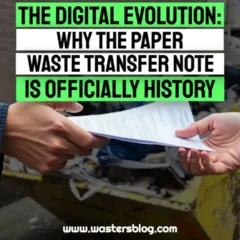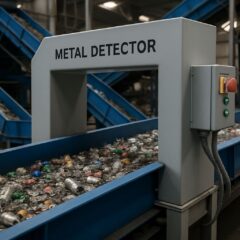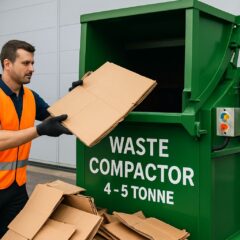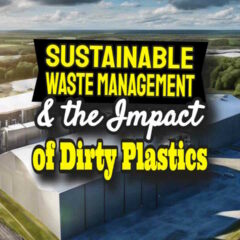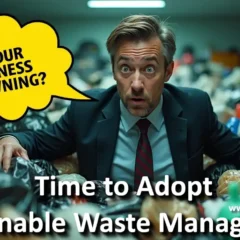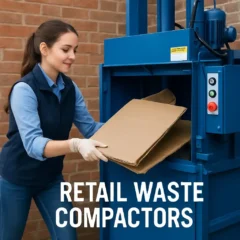waster
Top 10 Waste Management Companies UK by Turnover in 2025
Every year, the UK makes hundreds of millions of tonnes of waste. This waste is then treated, recycled, and turned into energy. This is now a huge business worth billions of pounds. This list shows the biggest waste management companies in the UK in 2025. It looks at their size, reach, and the services they […]
The Digital Evolution: Why the Paper Waste Transfer Note is Officially History
For decades, the UK waste industry was held together by a literal paper trail. If you’ve spent any time on a weighbridge or in a transport office, you know exactly what that looked like: crumpled Waste Transfer Notes (WTNs) stuffed into gloveboxes, rain-smudged signatures, and endless filing cabinets full of yellowing carbon copies. It was […]
How Metal Detectors Work in the Recycling Industry: Tireless Metal Contamination Detection & Removal
Metal detectors in the recycling industry use electromagnetic fields to detect and remove all metal contaminants, improving efficiency and equipment protection. By strategically placing detectors, contamination is minimized and ROI is maximized. Enhanced with AI, they reduce false positives while boosting accuracy, saving the industry significant losses…
Skip Hire vs Bin Rental: UK Skips and US Dumpsters Explained
If you’ve ever tried to price out waste removal across different countries, you’ll know the language changes even when the problem is the same: you’ve got debris, you need it gone, and you want the process to be painless. In the UK, that usually means skip hire; in the US, it’s typically dumpster rental. If […]
Plastic Recycling Guide: PET Bottles & What You Need to Know
Recycling PET plastic is simpler than you think and has a profound impact on our planet. Each properly recycled bottle reduces landfill waste and conserves energy. Discover the importance of recycling and how each action contributes to a sustainable world by processing PET back onto shelves within 60 days…
Eco-Friendly Trash Compactors to Reduce Business Waste
Commercial trash compactors use powerful technology to reduce waste volume by up to 90%, cutting costs and lowering carbon footprints. Businesses can save up to 75% on waste management while achieving sustainability goals and complying with regulations. Explore tailored solutions for seamless integration with existing systems…
Pros and Cons of Odor Control Technologies in Landfill Operations
Effective odor control in landfills requires a strategic blend of technologies. Chemical neutralizers and biofiltration systems each have pros and cons, from immediate relief to sustainability. Advanced monitoring and Byers Scientific’s vapor phase solution redefine modern odor management, maintaining community relations and regulatory compliance…
Problems with Plastic Waste Mount Up – It’s in Our Food and Our Blood
Problems with Plastic Waste: Plastic waste is a massive global problem, polluting land and oceans, harming wildlife through entanglement and ingestion, and breaking down into microplastics that enter the food chain, potentially impacting human health with toxic chemicals. Key Takeaways on the Problems with Plastic Waste Plastic pollution releases 19-23 million tons of waste into […]
The Impact of Dirty Plastics and Bioplastics in OFMSW on Efficient Energy Recovery
It’s crucial to comprehend how the Impact of Dirty Plastics and Bioplastics can affect the effectiveness of an MRF or ERF in achieving the clean extraction of plastics and bioplastics from the OFMSW has a significant impact on achieving sustainable waste management. Dirty plastics and bioplastics in OFMSW are a serious problem that must be […]
Sustainable Waste Management is Changing – Be Smart Stay-Ahead or Lose
Sustainable waste management is a philosophy of focusing on minimising environmental harm by reducing waste at the source, reusing materials, recycling, composting, and recovering energy, all while conserving resources, cutting landfill waste, lowering emissions, and ensuring economic viability and social responsibility. It was a concept built around the 3 Rs (Reduce, Reuse, Recycle) and nowadays […]
A Day in the Life of a Hazardous Waste Disposal Technician
Hazardous waste disposal technicians are the unsung heroes of environmental safety. Their meticulous work involves managing dangerous substances safely and in compliance with regulations. They protect communities while working with companies like EnviroSafe Solutions to ensure proper disposal, preventing contamination of soil, water, and air…
Retail Waste Compactor Guide: Ultimate Tips
Retail waste compactors are powerful tools for shops, supermarkets, and distribution centres—compressing bulky trash like cardboard, packaging, and general refuse to cut volume, reclaim space, and lower collection and disposal costs. These are also called commercial waste compactors, and options range from portable units for flexible needs to static systems for high-volume locations; most use […]



